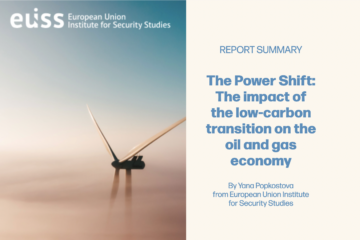Report Summary: International Humanitarian Law and Lethal Autonomous Weapon Systems
International Humanitarian Law and Lethal Autonomous Weapon Systems:
Legal Considerations for Acquisition and Procurement
By Lena Trabucco
The report details the legal challenges for Danish acquisition and procurement stakeholders in the context of lethal autonomous weapon systems (LAWS). Because of the rapid development of artificial intelligence (AI) and its potential for military capabilities, it is likely that AI will have a major role in future armed conflict. The time is now for Denmark to explore AI technology opportunities for the Danish Armed Forces. However, unlike its allies, Denmark has remained largely neutral on the issue of autonomous weapon systems.
The report examines two of the most pressing legal considerations for Danish acquisition of LAWS. First is the nature of LAWS technology under the requirements of international humanitarian law (IHL). The report’s analysis considers three major features of AI technology – transparency, machine predictability, and algorithmic bias – and details how they can complicate compliance with the IHL’s principles of distinction, proportionality, and precaution. Second, the report considers how responsibility can be divided and attributed to the multiple actors in the weapons system process, including direct considerations for acquisition and procurement officials. The analysis includes considerations on international legal responsibility, and corporate responsibility through the risks of strategic litigation for civilian firms as a potential barrier to collaboration and acquisition.
If and when Denmark decides to acquire LAWS, the report sets out five recommendations which can help guide policymakers towards responsible implementation of AI systems in future deliberations.
1. Formulate policy.
Formulating a national policy regarding Danish interpretation of LAWS can guide
military decision-makers and legal advisers as AI continues to be important in
discussions of future warfighting capabilities.
2. Encourage inter-agency coordination.
Greater compliance with IHL standards can be achieved through strengthened
cooperation between the Danish Acquisition and Logistics Office (DALO) and the legal
office of the Ministry of Defense.
3. Restructure TEVV procurement.
Denmark can mitigate challenges to autonomous weapon systems by restructuring the
Danish Testing, Evaluation, Validation, and Verification (TEVV) process.
4. Encourage joint acquisition/collaboration of LAWS through project development.
To ensure IHL compliance, Denmark may want to consider ways of acquiring LAWS
through project-based development, which offers the greatest control and flexibility over
design and development relative to off-the-shelf LAWS purchases.
5. Mitigate strategic litigation risks.
The Ministry of Defense can temper the risk of strategic litigation and reputational
backlash for defense collaboration through an actionable collaboration plan, combining
research, industry, and the state to explore innovative acquisition potential.
Read more here.


